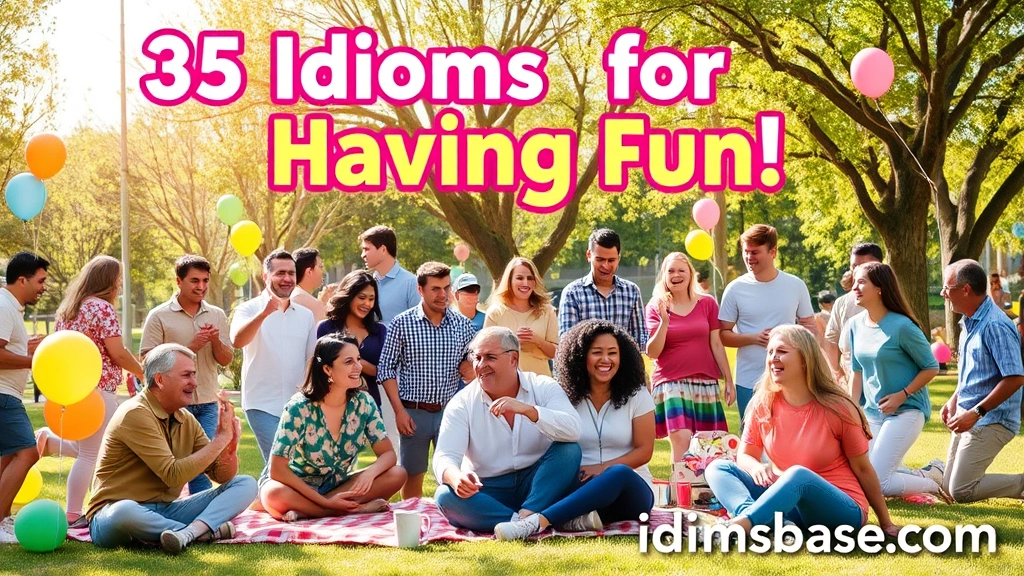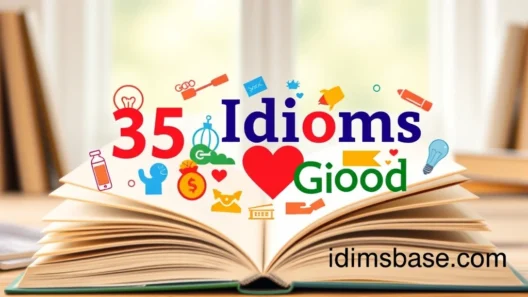Do you ever feel like your English vocabulary needs a little extra sparkle, especially when you're talking about having a good time? Well, you've come to the right place! English is brimming with colorful idioms that paint vivid pictures and add a delightful flair to your conversations. And when it comes to fun, there’s a whole playground of expressions waiting for you. Get ready to dive into a world where phrases aren't just words, but tiny stories that capture the joy and excitement of life!
Learning these idioms isn't just about memorizing phrases; it's about understanding the cultural nuances and adding a touch of native-speaker charm to your English. Imagine being able to effortlessly describe a fantastic party or a hilarious moment with just the right idiom. It's like unlocking a secret level in your language journey! So, let’s embark on this exciting adventure together and discover 35 amazing idioms that will make your English truly sing when you're talking about having fun.
35 Idioms for Having Fun
Get ready to infuse your conversations with more joy and expressiveness! Here are 35 fantastic idioms, each with its own unique flavor, perfect for describing those moments of pure delight.
-
Have a blast: This one is super common and means to have a really great time.
- Example: "We went to the concert last night and had a blast!"
-
Let your hair down: To relax and enjoy yourself, especially after being stressed or formal.
- Example: "It's Friday! Time to let your hair down and enjoy the weekend."
-
Paint the town red: To go out and celebrate in a lively, boisterous way.
- Example: "After passing their exams, they decided to paint the town red."
-
Have a whale of a time: To have an extremely enjoyable experience.
- Example: "The kids had a whale of a time at the amusement park."
-
Be a barrel of laughs: To be a very amusing or entertaining person or thing.
- Example: "My uncle is always a barrel of laughs at family gatherings."
-
Kick up your heels: To celebrate and enjoy yourself in a lively, unrestrained way.
- Example: "She finished her big project and just wanted to kick up her heels."
-
Live it up: To enjoy life to the fullest, often by spending money freely and having fun.
- Example: "They won the lottery and decided to live it up for a few years."
-
Have a ball: Similar to "have a blast," meaning to have a very good time.
- Example: "We had a ball at the beach party!"
-
Blow off steam: To do something to relieve stress or tension.
- Example: "After a tough week, I like to go for a run to blow off steam."
-
Go wild: To behave in an unrestrained or enthusiastic way, often in excitement.
- Example: "The crowd went wild when their team scored the winning goal."
-
Cut loose: To behave in a free and uninhibited way; to relax and enjoy oneself.
- Example: "It’s a party, don’t be shy, just cut loose!"
-
Make merry: To celebrate and enjoy oneself.
- Example: "Let's make merry and celebrate the New Year!"
-
Party hearty: To party with great enthusiasm and for a long time.
- Example: "They partied hearty all night long."
-
The life of the party: A person who is lively and entertaining at social gatherings.
- Example: "Sarah is always the life of the party; she makes everyone laugh."
-
Have a field day: To have an opportunity to do something enjoyable or to exploit a situation.
- Example: "The tabloids had a field day with the celebrity scandal."
-
Break the ice: To initiate social interaction in a gathering, often by making a joke or starting a conversation.
- Example: "He told a funny story to break the ice at the workshop."
-
Hit the town: To go out and enjoy oneself in the city, especially at night.
- Example: "After dinner, we decided to hit the town for some dancing."

-
Whoop it up: To make a lot of noise and celebrate in a lively way.
- Example: "You could hear them whooping it up all the way down the street."
-
Get your groove on: To dance and enjoy music.
- Example: "The DJ started playing our favorite song, and we all got our groove on."
-
Kick back: To relax and do nothing.
- Example: "On Sundays, I just like to kick back and read a book."
-
Hang loose: To relax and be calm.
- Example: "Don't worry about it, just hang loose and enjoy the ride."
-
Have a good time: A straightforward way to say you enjoyed yourself.
- Example: "Did you have a good time at the festival?"
-
Be in high spirits: To be cheerful and lively.
- Example: "Everyone was in high spirits after the team won the championship."
-
Let off some steam: Similar to "blow off steam," to release pent-up energy or stress.
- Example: "After a long week, a game of soccer helps me let off some steam."
-
Have a blast from the past: To experience something that reminds you strongly of an earlier time.
- Example: "Hearing that old song was a real blast from the past!"
-
Roll in the aisles: To laugh uncontrollably.
- Example: "The comedian was so funny, the audience was rolling in the aisles."
-
Have a laugh: To enjoy oneself by laughing, often with friends.
- Example: "We always have a good laugh when we get together."
-
Live it large: To live in a luxurious and extravagant way, often implying a lot of fun.
- Example: "After his big promotion, he started living it large."

-
Be on cloud nine: To be extremely happy.
- Example: "She's been on cloud nine ever since she got the job offer."
-
Grin from ear to ear: To smile very broadly, showing great pleasure.
- Example: "He was grinning from ear to ear after winning the competition."
-
Be full of the joys of spring: To be very happy and lively.
- Example: "She woke up full of the joys of spring, ready for the day."
-
Lighten up: To become less serious or anxious.
- Example: "Oh, lighten up! It was just a joke."
-
Kick back and relax: To take it easy and unwind.
- Example: "After a busy week, I just want to kick back and relax."
-
Have a riot: To find something extremely funny or to have a very entertaining time.
- Example: "The stand-up show was hilarious; we had a riot!"
-
The more the merrier: An expression meaning that the more people there are, the more enjoyable a situation will be.
- Example: "Do you mind if I bring a few friends? "Not at all, the more the merrier!"
Why Use Idioms?
You might be thinking, "Why bother with all these extra phrases when I can just say 'I had fun'?" That's a great question, and the answer is simple: idioms add flavor, authenticity, and a deeper connection to the English language. They are the spices that make your conversation truly palatable!
- Expressiveness: Idioms allow you to convey emotions and situations with greater nuance and vividness. "Having a blast" feels much more energetic than simply "having fun."
- Cultural Understanding: Many idioms are deeply rooted in culture. Understanding them helps you grasp the subtle humor, history, and values of English-speaking communities.
- Sounding Natural: Native speakers use idioms all the time, often without even realizing it. Incorporating them into your speech will make you sound more natural and fluent.
- Engagement: Idioms can make your conversations more interesting and engaging. They often paint a picture, making it easier for your listener to visualize what you're describing.
Think of it like this: you could describe a delicious meal by just saying "it tasted good," or you could say "it was a feast for the senses!" Which one sounds more appetizing? Idioms do the same for your language – they make it richer and more appealing.

FAQ Section
You've got questions, and we've got answers! Let’s dive into some common queries about using idioms.
Q1: What exactly is an idiom?
An idiom is a phrase or expression whose meaning cannot be understood from the ordinary meanings of its words. For example, "kick the bucket" doesn't literally mean to kick a bucket; it means to die. Their meanings are often figurative and must be learned as a whole unit.
Q2: Are idioms used in formal or informal settings?
Most of the idioms for "having fun" are generally used in informal or casual settings, like conversations with friends, family, or colleagues you know well. Using them in highly formal contexts, such as a business presentation or academic paper, might sound out of place. Always consider your audience and the situation!
Q3: How can I remember so many idioms?
Great question! Here are a few tips:
- Context is Key: Learn idioms in context, not just as isolated phrases. Read them in sentences, and try to use them in your own conversations.
- Visualize: Many idioms create a mental image. Try to picture "painting the town red" or "having a whale of a time."
- Practice Regularly: The more you use them, the more natural they will become. Start with a few, master them, and then add more to your repertoire.
- Flashcards or Apps: Use flashcards, or language learning apps that focus on idioms, for quick review.
- Listen Actively: Pay attention to how native speakers use idioms in movies, TV shows, podcasts, and daily conversations.
Q4: Can I create my own idioms?
While language is always evolving and new expressions do emerge, creating your own idiom that becomes widely understood is very rare. Idioms typically develop organically within a language community over time. It's best to stick to established idioms to ensure your message is understood!
Q5: Are there regional differences in idioms?
Absolutely! English is a global language, and while many idioms are universally understood, some are more common in specific regions (e.g., British English vs. American English vs. Australian English). The idioms listed here are generally widely understood across different English-speaking countries, but it's always good to be aware that regional variations exist. For example, "having a good crack" is a common way to say "having fun" in Ireland.
Q6: What's the difference between an idiom and a proverb?
Both idioms and proverbs are fixed expressions, but they serve different purposes.
- Idiom: A phrase whose meaning isn't obvious from its individual words. It's usually part of a sentence to add color or specific meaning. (e.g., "It's raining cats and dogs.")
- Proverb: A short, well-known saying that expresses a general truth or piece of advice. (e.g., "Actions speak louder than words.")
Q7: Will using idioms make me sound more fluent?
Yes, definitely! Using idioms appropriately shows a deeper understanding of the language and its cultural nuances. It indicates that you're not just translating word-for-word but thinking in English, which is a hallmark of fluency. It adds a layer of authenticity and sophistication to your communication.
Key Takeaways
You've journeyed through a fantastic collection of idioms for having fun, and hopefully, you're feeling inspired to use them! Here are the main things to remember:
- Idioms Enrich Your English: They add color, expressiveness, and naturalness to your conversations, making your language more engaging and vibrant.
- Context is Crucial: Always consider the situation and your audience before using an idiom. Most fun-related idioms are best suited for informal settings.
- Practice Makes Perfect: Don't be afraid to try using these idioms. Start with a few that you like, and gradually integrate more into your vocabulary.
- Listen and Learn: Pay attention to how native speakers use idioms in real-life situations to improve your understanding and usage.
- Beyond "Fun": While we focused on fun today, remember that idioms exist for every conceivable topic, making English a truly rich and fascinating language to explore!
So, go forth and "have a blast" with your newfound idiomatic knowledge! May your conversations be ever so lively and your English filled with the joy of expression. Keep practicing, keep exploring, and most importantly, keep having fun with the language!






